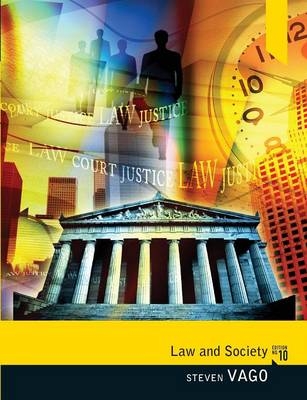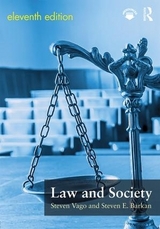
Law and Society
Routledge (Verlag)
978-0-205-82038-2 (ISBN)
- Titel erscheint in neuer Auflage
- Artikel merken
Examines the interplay between law and society.
Law and Society, 10e provides an informative, balanced and comprehensive analysis of the interplay between law and society. This text presents an overview of the most advanced interdisciplinary and international research, theoretical advances, ongoing debates and controversies. It raises new levels of awareness on the structure and functions of law and legal systems and the principal players in the legal arena and their impact on our lives. In addition, it looks at the legal system the context of race, class, and gender and considers multicultural and cross-cultural issues in a contemporary and interdisciplinary context.
Note: MySearchLab does not come automatically packaged with this text. To purchase MySearchLab, please visit: www.mysearchlab.com or you can purchase a ValuePack of the text + MySearchLab with Pearson eText (at no additional cost). ValuePack ISBN-10: 0205863744 / ValuePack ISBN-13: 9780205863747
Dr. Steven Vago was born in Debrecen, Hungary in 1937. He was a brilliant student and athlete, and at the age of only 19, he became one of the legendary Hungarian Freedom Fighters during the 1956 uprising and revolution. He escaped to Austria just prior to the closing of the border between Hungary and Austria by the Soviet Army. He made his way across Europe and eventually to the United States. Vago matriculated from the University of Alabama where he received his B. A. in Sociology. Upon graduation, Vago furthered his graduate education at Washington University in St. Louis, where he earned two Ph. Ds: one in Sociology and one in Anthropology. During graduate school he was an integral part of the creation of an alcohol treatment program at Malcolm Bliss Hospital in St. Louis. Steven became part of the Department of Sociology at St. Louis University after finishing his graduate studies, and was a full professor there by the age of 37. Thereafter, he chaired the Department of Sociology several times, teaching at St. Louis University for over 30 years. During the 1970's, Steve was asked by the United Nations to work for its member agency UNESCO, and worked in Paris for several years in their Office of Population and Demography. During the years of Steve's involvement in the field of Sociology, he was frequently asked, by universities throughout the United States and Canada, to participate in a variety of discussions addressing the legal and social changes occurring in the former Soviet Union and its Eastern European satellites. In 1975, he met and married Kathe Hartley, a St. Louis on-air reporter working for the CBS-owned KMOX Radio in St. Louis. At the end of his teaching career in 2001, Steven and Kathe retired to Bellingham, Washington. Vago passed away in 2010, at the age of 73.
In this section:
1. BRIEF TABLE OF CONTENTS:
2. COMPREHENSIVE TABLE OF CONTENTS:
1.BRIEF TABLE OF CONTENTS:
PREFACE
1. INTRODUCTION
2. THEORETICAL PERSPECTIVES
3. THE ORGANIZATION OF LAW
4. LAWMAKING
5. LAW AND SOCIAL CONTROL
6. LAW AND DISPUTE RESOLUTION
7. LAW AND SOCIAL CHANGE
8. THE LEGAL PROFESSION
9. RESEARCHING LAW IN SOCIETY
2. COMPREHENSIVE TABLE OF CONTENTS:
PREFACE
1. INTRODUCTION
OVERVIEW
DEFINITIONS OF LAW
TYPES OF LAW
MAJOR LEGAL SYSTEMS
Romano-Germanic System
Common-Law System
Socialist Legal System
Islamic Legal System
PRINCIPAL FUNCTIONS OF LAW
Social Control
Dispute Settlement
Social Change
DYSFUNCTIONS OF LAW
PARADIGMS OF SOCIETY
The Consensus Perspective
The Conflict Perspective
OPTIONS FOR SOCIOLOGISTS
SUMMARY
SUGGESTED FURTHER READINGS
REFERENCES
2. THEORETICAL PERSPECTIVES
THE EVOLUTION OF LEGAL SYSTEMS
Primitive Legal Systems
Transitional Legal Systems
Modern Legal Systems
THEORIES OF LAW AND SOCIETY
The European Pioneers
Classical Sociological Theorists
Sociolegal Theorists
Contemporary Law and Society Theorists
CURRENT INTELLECTUAL MOVEMENTS IN LAW
The Functionalist Approach
Conflict and Marxist Approaches
Critical Legal Studies Movement
Feminist Legal Theory
Critical Race Theory
SUMMARY
SUGGESTED FURTHER READINGS
REFERENCES
3. THE ORGANIZATION OF LAW
COURTS
Dispute Categories
The Organization of Courts
Participants in Court Processes
The Flow of Litigation
LEGISLATURES
The Organization of Legislatures
Participants in the Legislative Process
ADMINISTRATIVE AGENCIES
The Organization of Administrative Agencies
The Administrative Process
LAW ENFORCEMENT AGENCIES
The organization of Law Enforcement Agencies
Police Discretion
SUMMARY
SUGGESTED FURTHER READINGS
REFERENCES
4. LAWMAKING
PERSPECTIVES ON LAWMAKING
LEGISLATION
ADMINISTRATIVE LAWMAKING
Administrative Rulemaking
Administrative Adjudication
JUDICIAL LAWMAKING
Lawmaking by Precedents
The Interpretation of Statutes
The Interpretation of Constitutions
INFLUENCES ON THE LAWMAKING PROCESS
Interest Groups
Public Opinion
Law making and Social Science
SOURCES OF IMPETUS FOR LAW
Detached Scholarly Diagnosis
A Voice from the Wilderness
Protest Activity
Social Movements
Public Interest Groups
The Mass Media
SUMMARY
SUGGESTED FURTHER READINGS
REFERENCES
5. LAW AND SOCIAL CONTROL
INFORMAL SOCIAL CONTROLS
FORMAL SOCIAL CONTROLS
Criminal Sanctions
Discord over the Death Penalty
Civil Commitment
CRIMES WITHOUT VICTIMS
Drug Addiction
Prostitution
Gambling
WHITE-COLLAR CRIME
SOCIAL CONTROL OF DISSENT
ADMINISTRATIVE LAW AND SOCIAL CONTROL
SUMMARY
SUGGESTED FURTHER READINGS
REFERENCES
6. LAW AND DISPUTE RESOLUTION
A NOTE ON TERMINOLOGY
METHODS OF DISPUTE RESOLUTION
Primary Resolution Processes
Hybrid Resolution Processes
DEMANDS FOR COURT SERVICES IN DISPUTE RESOLUTION
Variations in Litigation Rates
PREREQUISITES FOR THE USE OF COURTS IN DISPUTE RESOLUTION
A TYPOLOGY OF LITIGANTS
DISPUTES BETWEEN INDIVIDUALS
DISPUTES BETWEEN INDIVIDUALS AND ORGANIZATIONS
Law as a Method of Dispute Resolution in Academe
The Courts as Collection Agencies
DISPUTES BETWEEN ORGANIZATIONS
Public Interest Law Firms in Environmental Disputes
SUMMARY
SUGGESTED FURTHER READINGS
REFERENCES
7. LAW AND SOCIAL CHANGE
RECIPROCITY BETWEEN LAW AND SOCIAL CHANGE
SOCIAL CHANGES AS CAUSES OF LEGAL CHANGES
LAW AS AN INSTRUMENT OF SOCIAL CHANGE
The Efficacy of Law as an Instrument of Social Change
ADVANTAGES OF LAW IN CREATING SOCIAL CHANGE
Legitimate Authority
The Binding Force of Law
Sanctions
LIMITATIONS OF LAW IN CREATING SOCIAL CHANGE
Law as a Policy Instrument
Morality and Values
RESISTANCE TO CHANGE
Social Factors
Psychological Factors
Cultural Factors
Economic Factors
SUMMARY
SUGGESTED FURTHER READINGS
REFERENCES
8. THE LEGAL PROFESSION
BACKGROUND
THE PROFESSIONALIZATION OF LAWYERS
THE EVOLUTION OF THE AMERICAN LEGAL PROFESSION
THE PROFESSION TODAY
WHERE THE LAWYERS ARE
Private Practice
Government
Private Employment
Judiciary
REVENUE STREAMS: LAWYERS AND MONEY
COMPETITION FOR BUSINESS
LEGAL SERVICES FOR THE POOR AND NOT SO POOR
LAW SCHOOLS
Socialization into the Profession
BAR ADMISSION
BAR ASSOCIATIONS AS INTEREST GROUPS
PROFESSIONAL DISCIPLINE
SUMMARY
SUGGESTED FURTHER READINGS
REFERENCES
9. RESEARCHING LAW IN SOCIETY
METHODS OF INQUIRY
Historical Methods
Observational Methods
Experimental Methods
Survey Methods
THE IMPACT OF SOCIOLOGY ON SOCIAL POLICY
Contributions of Sociology to Policy Recommendations
Contributions of Sociology to Enacted Policy
EVALUATION RESEARCH AND IMPACT STUDIES
SUMMARY
SUGGESTED FURTHER READINGS
REFERENCES
| Erscheint lt. Verlag | 2.2.2011 |
|---|---|
| Verlagsort | New York |
| Sprache | englisch |
| Maße | 177 x 231 mm |
| Gewicht | 750 g |
| Themenwelt | Recht / Steuern ► Allgemeines / Lexika |
| Recht / Steuern ► EU / Internationales Recht | |
| Sozialwissenschaften ► Soziologie | |
| ISBN-10 | 0-205-82038-7 / 0205820387 |
| ISBN-13 | 978-0-205-82038-2 / 9780205820382 |
| Zustand | Neuware |
| Informationen gemäß Produktsicherheitsverordnung (GPSR) | |
| Haben Sie eine Frage zum Produkt? |
aus dem Bereich



